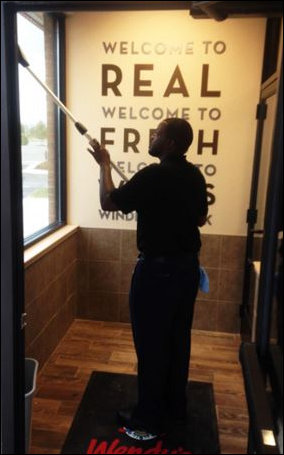
Raheim Watson grew up in Harlem, New York, surrounded by drugs and violence but decided he wanted a different life when his son was born. He moved to Richmond in 2014, where he has purchased a home, the first one in his family to do so, and, with help from UnBoundRVA, started his own business. His window-washing business is focused on the residential and small-commercial market.
by James A. Bacon
UnBoundRVA is my kind of anti-poverty initiative! The organization identifies people in low-income neighborhoods who have the potential to succeed as small business owners, and then provides them a year of training, advice and networking support as they develop a business plan.
Once the business models are in place, each hopeful business owner makes a pitch for startup capital from a collective pool of $100,000 in low-interest loans. UnBoundRVA then connects the businesses with partners who provide pro bono services in areas such as legal, accounting, marketing and banking.
UnBoundRVA made it into the news recently when the Richmond Times-Dispatch highlighted a $20,000 donation to the group by Pat Hull, the entrepreneur behind logistics apps Getloaded.com and Scoopmonkey.com. “Your dream may not be the next Google. But who cares, if you are supporting your family and creating jobs?”
The not-for-profit enterprise was founded by Sarah Mullens and Richard Luck, who met while teaching in the inner city as part of the Teach for America program. They saw a large number of talented individuals who weren’t pursuing a college track for reasons that had nothing to do with ability or work ethic. “We believe that potential is restricted by the forces of the poverty cycle, and that the human capital of these individuals is our nation’s greatest underutilized asset,” states the UnBoundRVA website.
High-potential individuals in the current class, which will finish in June, are pursuing businesses in the following areas: clean-up services for construction projects, a mobile auto detailing service, a professional house organizing and redesign service, vegan cookies, and a mobile virtual reality gaming experience.
Bacon’s bottom line: Give a man a fish, you feed him for a day. Teach him how to fish, and you feed him for his life. In contrast to so many leftist-inspired “social justice” programs that don’t even feed a man for a day — they teach him to march and protest until someone gives him a fish — UnBoundRVA teaches people to fish. It may not provide a systemic cure for poverty, a goal that has eluded this nation despite the expenditure of trillions of dollars in public and philanthropic anti-poverty programs over the years, but it can make a tremendous difference to the people whose lives it touches.
If you want to address the “root causes” of poverty, you have to change the lives of people one individual at a time. UnBoundRVA does that.
That said, it’s not clear from the website if UnBoundRVA is a cost-effective way to address poverty. The program has an annual budget of $268,000, supporting a staff of four full-time employees and one part-time. How many people does it help with that annual investment? According to the website, UnBoundRVA collects the names of individuals interested in starting their own business, enrolls twelve candidates in a six-week workshop and selects the five most promising for a one-year program of business support. The website does not say how many times it runs through this cycle each year. If only once, not so good. If eight or nine times, helping 40 or more people, that’s more defensible. One thing I do believe: It’s a model worth trying.


